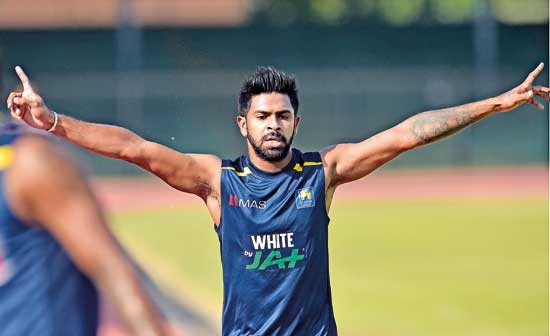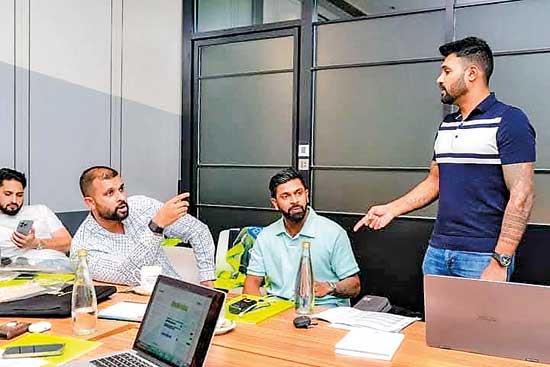Dickwella walks scot free; questions remain on epics and ethics
While the slashing of his sentence may appear to be a victory for the player, it also highlights the deeper and more sinister issue of drug use within cricket. The case, which initially seemed like an isolated incident, now requires a thorough investigation to uncover how deeply entrenched narcotics might be within the sport.

I’m back!!!
Soon after Dickwella’s ban was reduced, Sri Lanka Cricket (SLC) issued a press release allowing the 31-year-old to resume his career almost immediately. Its justification was that Dickwella had not consumed any banned substances during the ‘competition period’, and that the substance in question was unrelated to enhancing sports performance.
While the SLC statement might seem clear-cut on the surface, it raises an alarm. The question is not whether or not the appeal decision was technically correct, but whether the deeper issues of corruption and drug abuse are being swept under the carpet.
It is not the issue of challenging the decision of the Appeals Committee, which determined that Dickwella’s affidavit aligned with the World Anti-Doping Agency (WADA) guidelines for reduced sanctions. The appeal acknowledged that the presence of the parent compound and a benzoylecgonine concentration below 1000ng/ml (371.5ng/ml) supported the claim that the drug use was out-of-competition. In this context, WADA’s provisions may seem to support Dickwella’s position.

Dickwella (2nd from right) with Galle Marvels team officials, seated on left is the owner of the franchise Pream Thakkar, who is now in remand custory following match-fixing allegations
However, the real issue here is not the technicalities of the appeal. The crux of the matter lies in Dickwella’s two affidavits, submitted on August 29, 2024, and November 11, 2024, and are now in the public domain. He has admitted to using cocaine—an illegal drug under Sri Lankan law. Yet, neither SLC nor law enforcement authorities have investigated the matter further.
Dickwella clearly states that he attended an event hosted by the owner of the Galle team, who is now in remand custody facing charges of match-fixing during the ongoing T10 league tournament in Kandy.
At this event, Dickwella claims he consumed the prohibited substance while intoxicated. This is where the danger lies. Dickwella’s personal admission of drug use is a criminal offence. What is even more concerning is the lack of investigation into the deeper issues surrounding how such drugs made their way into the hands of players.
Dickwella’s confession of cocaine use should be enough to prompt an urgent probe into how widespread drug use might be within the sport. The presence of illicit substances is a serious violation of both sporting and legal ethics, and the authorities must take swift action.
Regardless of whether or not it enhances performance, the use of narcotics is a criminal offence and steps must be taken to send a clear message to young cricketers attempting to break into the national setup.
Franchise leagues and match-fixing
The explosive growth of franchise cricket has brought immense financial opportunities for players. However, this rapid expansion has also resulted in a severe blow to the integrity of the sport. Leagues like the Lanka Premier League (LPL) and the Lanka T10 Super League, which is currently being played in Pallekele, are not just breeding grounds for cricketing talent; they’ve become playgrounds for corruption. Let’s not sugarcoat it: this isn’t cricket; it’s a circus where profiteers and corruptors thrive at the expense of players and the sport’s soul.
Just a few months ago, Tamim Rahman, the owner of the Dambulla Thunders team in the LPL, was arrested and charged with attempted match-fixing during the tournament. It was during this same tournament that Dickwella admitted to having taken drugs. Now, in the T10 league, the owner of the Galle Marvels team has been arrested and remanded over match-fixing charges. Sources claim this is just the tip of the iceberg as many, including ‘greedy’ player managers, could be involved in these heinous crimes committed in the name of the gentleman’s game.
Sri Lanka was the first country in Asia to criminalise sports-related corruption. Yet, this has not prevented the exploitation of the sport by those seeking to profit from dishonest deals. The country’s pioneering efforts must not be undermined by complacency or lack of action. If cricket is to remain a sport that the public can trust, it must root out the corruption that is currently taking root.
Former Sri Lanka cricket captain Kumar Sangakkara has been a vocal critic of the unchecked growth of franchise cricket, particularly its corrupting influence on players and the integrity of the sport. Recently addressing the Sri Lanka Law College International Research Conference, Sangakkara expressed his concern about the dangers of franchise leagues and the need for systemic reform within the sport.
“The advent of the IPL and the proliferation of franchise leagues have provided incredible opportunities for players,” he said.
“However, this has also created significant challenges. If we’re not careful, we could soon see players signing central contracts with franchises instead of their home boards, robbing fans of the joy of watching their best players represent their nations.”
Sangakkara’s words reflect growing tension within the sport where the rise of commercial interests has created opportunities for players but also allowed corruption to grow rampantly.


